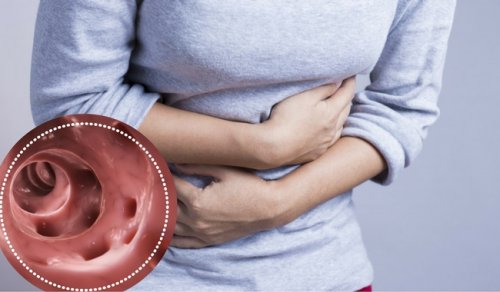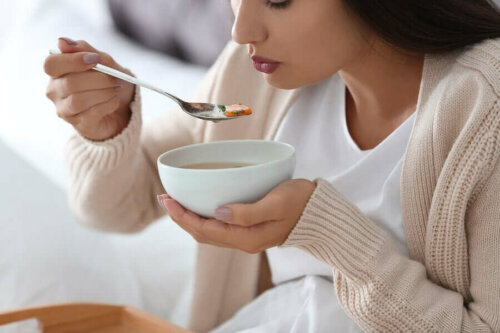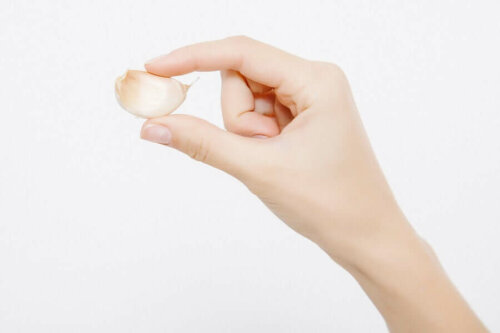How to Fight Diverticulitis Naturally


Written and verified by the doctor Nelton Abdon Ramos Rojas
Diverticulitis is a condition that affects your digestion. It appears in the intestines when sacs in your intestinal wall, called diverticula, become inflamed.
Experts don’t know what causes this inflammation. However, some believe that it’s brought by defecating too forcefully. This puts pressure on the intestinal walls and can provoke inflammation and irritation. We tell you more about it below.
What you need to know about diverticulitis
Factors such as a low fiber diet, excess weight, obesity, lack of exercise, and smoking are related to the development of the disease. Nevertheless, they aren’t the only ones.
According to the MSD Manual, the symptoms of diverticulitis are usually fever and tenderness or pain to the touch (usually in the lower left part of the abdomen). Sometimes, it can also cause nausea and vomiting.
If you experience these symptoms and other discomforts, it’s best to see a doctor for an early evaluation and diagnosis. It isn’t advisable to self-medicate or resort to home remedies.
Once the doctor prescribes the treatment, it’s essential to follow their instructions and, at the same time, improve lifestyle habits, mostly dietary habits.
How to relieve diverticulitis naturally? By eating!

When diverticulitis is mild, the doctor usually prescribes rest and a liquid diet. The patient must follow this to the letter in order to get better. Later, once the doctor authorize its, you could incorporate the following foods into your diet, little by little.
At the beginning, you can incorporate broths, soft creams, fruit juices without pulp, gelatin, cooked vegetables and fruits (without the peel or seeds), eggs, poultry, cereals (with low fiber content), yogurt, white rice, pasta , refined white bread. and noodles.
Although this is implicit, you must remember that fatty and spicy foods should be excluded during the recovery process, as they may aggravate the symptoms of the disease.
Discover: Three Cream of Vegetable Recipes to Strengthen Defenses
Mashed potatoes
As it’s bad idea to eat fatty foods, like fried potatoes, it’s best to make mashed potatoes or eat a baked potato as a side dish.
This is because they contain a lot of anti-inflammatory compounds and starch, which facilitate their digestion.
Papaya and pears
These fruits may prove beneficial for diverticulitis. Both are easy to digest and contain fiber, antioxidants, vitamins, and minerals, which are nutrients that may help improve gastrointestinal health.
Also, the combination of papaya and pear is delicious.
Barley
Although fiber-rich foods (such as cereals) aren’t recommended, barley, due to its high content of soluble fiber and its respective anti-inflammatory effect, may help relieve diverticulitis.
You can consume it in many ways: in soups, stews, mixed with vegetables, and so on.
Garlic

Garlic is a common food that’s believed to have several medicinal properties. However, in the scientific community, there’s no definitive consensus on this.
At the moment, it’s known that some components of garlic, under certain laboratory conditions (in vitro, for example) have been shown to have several positive effects, both in rodents and in humans.
To reap the benefits it can provide, we recommend including it in moderation in a balanced diet, as in the Mediterranean diet.
In case of stomach discomfort or diverticulitis, some people there are recommend including garlic soup in the diet your doctor prescribes.
Discover: The Benefits of Putting a Garlic Clove Under Your Pillow
Oregano
According to popular beliefs, seasoning dishes with oregano (instead of salt) in case of diverticulitis may be convenient, since this aromatic herb has digestive and toning properties.
Discover: 8 Natural Medicinal Uses for Oregano Oil
Foods rich in vitamin C
Fruits rich in vitamin C (lemons, grapefruits, oranges, and strawberries, etc.) could contribute to digestive health, as this nutrient may help heal the intestine.
Additionally, we mustn’t forget that this vitamin favors iron absorption and that it plays a key role in the production of collagen, which is why it’s essential for the body.
Simply put, vitamin C helps the body create new cells and heal. This doesn’t mean that it’ll cure you on its own but that it may benefit health in many ways.
The importance of having a good diagnosis
The symptoms of diverticulitis are similar to those of other digestive afflictions, like Crohn’s disease. Because of this, we advise you to consult your doctor for an evaluation so they can tell you what’s really happening.
Colon infections may hide larger issues, so don’t ignore the symptoms.
All cited sources were thoroughly reviewed by our team to ensure their quality, reliability, currency, and validity. The bibliography of this article was considered reliable and of academic or scientific accuracy.
- A., B., M.S., D., R.A., B., G.B., F., & S.A., J. (2013). The role of non-starchy polysaccharides (“soluble” dietary fibre), in particular (1,3;1,4)-beta-glucans and arabinoxylans, in promoting bowel health. Planta Medica.
- Dahl, C., Crichton, M., Jenkins, J., Nucera, R., Mahoney, S., Marx, W., & Marshall, S. (2018). Evidence for dietary Fibre modification in the recovery and prevention of reoccurrence of acute, uncomplicated diverticulitis: A systematic literature review. Nutrients. https://doi.org/10.3390/nu10020137
- Gutiérrez-Grijalva, E., Picos-Salas, M., Leyva-López, N., Criollo-Mendoza, M., Vazquez-Olivo, G., & Heredia, J. (2017). Flavonoids and Phenolic Acids from Oregano: Occurrence, Biological Activity and Health Benefits. Plants. https://doi.org/10.3390/plants7010002
This text is provided for informational purposes only and does not replace consultation with a professional. If in doubt, consult your specialist.








